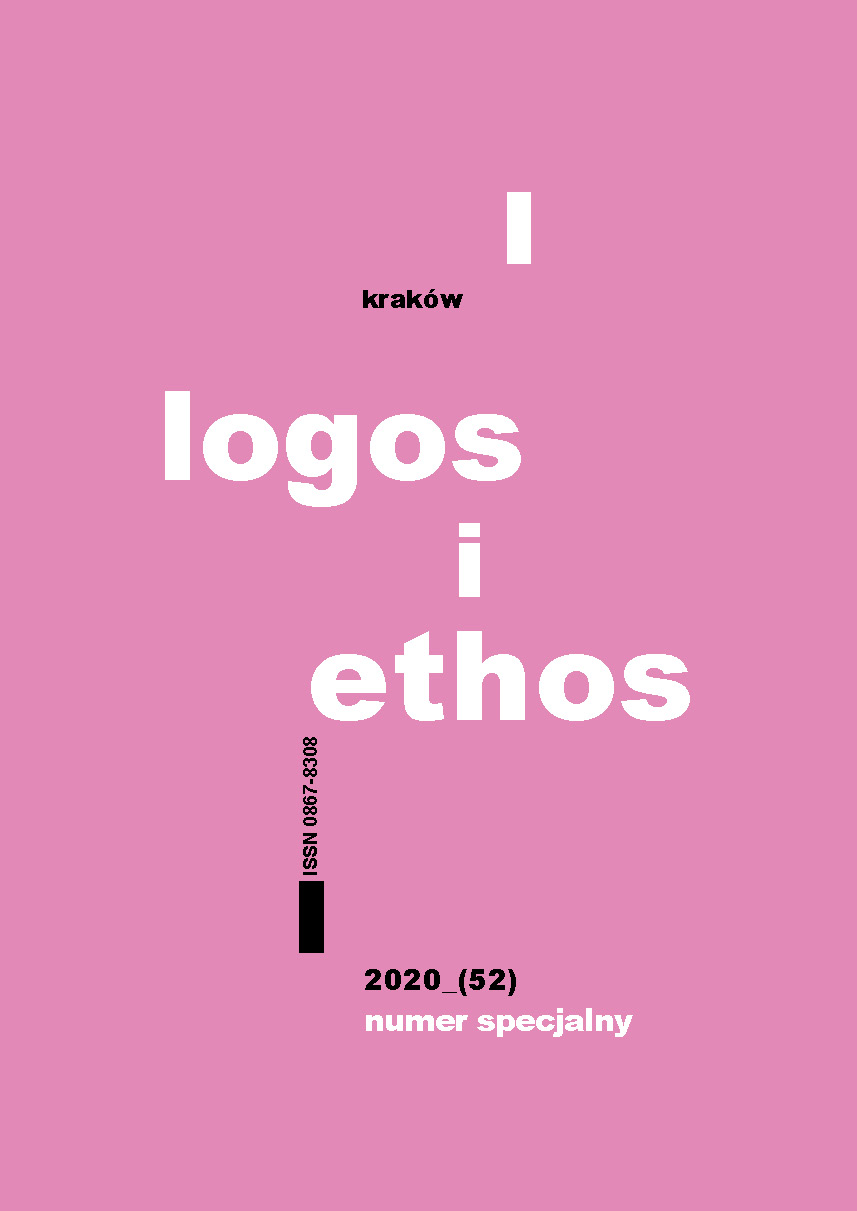Ethics in autonomous robots as philosophy in silico: The study case of phronetic machine ethics
DOI:
https://doi.org/10.15633/lie.3576Słowa kluczowe:
modelowanie komputerowe, cyfrowa humanistyka, etyka maszyn, roboty autonomiczne, metodologia filozofii, metodologia etykiAbstrakt
W artykule przestawiono zastosowanie narzędzi informatycznych do modelowania koncepcji etycznych. Komputerowe modelowanie nazywane jest modelowaniem in silico. Metody tego typu mają zastosowania m.in. w biologii, chemii, kosmologii, socjologii. Rzadko jednak stosuje się to podejście do modelowania problemów filozoficznych (jak etyka). Obecnie wydaje się ono obiecujące nie tylko dla uproszczenia rozwoju etycznych robotów, ale i dla głębszego wglądu w istotę filozoficznych problemów uwikłanych w kwestie związane z etyką maszyn (poprzez ukazanie ich wewnętrznej struktury). Artykuł ukazuje również zwięzły przegląd koncepcji modelowania w kontekście historycznym, jak i we współczesnym.
Bibliografia
Alaieri F., Vellino A., Ethical decision making in robots: Autonomy, trust and responsibility, in: Social Robotics, eds. A. Agah, J.-J. Cabibihan, A. M. Howard, et al., vol. 9979, Cham 2016, p. 159–168, doi: 10.1007/978-3-319-47437-3_16.
Anderson M., Anderson S. L., GenEth: General Ethical Dilemma Analyzer, in: Proceedings of the Twenty-Eighth AAAI Conference on Artificial Intelligence, Québec 2014, p. 253–261.
Anderson M., Anderson S. L., Machine Ethics, Cambridge 2011.
Aristotle, The Nicomachean Ethics, trans. J. A. K. Thomson, London–New York 2004.
Beaney M., Analysis, in: The Stanford Encyclopedia of Philosophy (Summer 2018 Edition), ed. E. N. Zalta, Stanford 2018, https://stanford.library.sydney.edu.au/archives/sum2018/entries/analysis/.
European Parliament, Civil Law Rules on Robotics European Parliament resolution of 16 February 2017 with recommendations to the Commission on Civil Law Rules on Robotics (2015/2103(INL)), https://www.europarl.europa.eu/doceo/document/TA-8-2017-0051_EN.html.
Floridi L., Sanders J. W., On the morality of artificial agents, “Minds and Machines” 14 (2004) no. 3, p. 349–379, doi: 10.1023/B:MIND.0000035461.63578.9d.
Heller M., Evolution of space-time structures, “Concepts of Physics” 3 (2006), p. 117–131.
Heller M., How is philosophy in science possible?, “Philosophical Problems in Science (Zagadnienia Filozoficzne w Nauce)” 2019 no. 66, p. 231–249.
Hempel C. G., Philosophy of Natural Science, Englewood Cliffs 1966.
Janusz R., O metodach wirtualnych w paradygmacie obiektowym, “Zagadnienia Filozoficzne w Nauce” 2007 no. 41, p. 125–131.
Janusz R., Program dla Wszechświata: filozoficzne aspekty języków obiektowych, Kraków 2002.
Janusz R., Relacja etyczno-psychologiczna w ujęciu obiektowym, in: Philosophiae & musicae: księga pamiątkowa z okazji jubileuszu 75-lecia urodzin księdza profesora Stanisława Ziemiańskiego SJ, red. R. Darowski, Kraków 2006, p. 375–380.
Larouche L., Examination of the axiomatic foundations of a theory of change I, “Notre Dame Journal of Formal Logic” 9 (1968) no. 4, p. 371–384.
Leite I., Martinho C., Paiva A., Social Robots for Long-Term Interaction: A Survey, “International Journal of Social Robotics” 5 (2013) no. 2, p. 291–308, doi: 10.1007/s12369-013-0178-y.
Newton I., Philosophiae Naturalis Principia Mathematica, Londini 1687.
Oers R. van, Wesselman E., Social Robots, https://assets.kpmg/content/dam/kpmg/pdf/2016/06/social-robots.pdf.
Polak P., Philosophy in science: A name with a long intellectual tradition, “Philosophical Problems in Science (Zagadnienia Filozoficzne w Nauce)” 2019 no. 66, p. 251–270.
Polak P., Krzanowski R., Phronetic ethics in social robotics: A new approach to building ethical robots (2019), doi: 10.13140/rg.2.2.16802.79049.
Raine D. J., Heller M., The Science of Space-Time, Tucson, AZ 1981.
Randall J. H., Aristotle, New York 1965.
Rawls J., A Theory of Justice, Cambridge 1971.
Reeve C. D. C., Practices of Reason: Aristotle’s Nicomachean Ethics, Oxford 1992.
Salamucha J., Dowód ex motu na istnienie Boga. Analiza logiczna argumentacji św. Tomasza z Akwinu, “Collectanea Theologica” 54 (1934) nr 1–2, p. 53–92.
Salamucha J., The proof ex motu for the existence of God. Logical analysis of St. Thomas’ arguments, “The New Scholasticism” 32 (1958), p. 327–372.
Searle J. R., Mind, Language and Society: Philosophy in the Real World, New York 1998.
Sloman A., The Computer Revolution in Philosophy: Philosophy, Science, and Models of Mind, Atlantic Highlands, NJ 1978.
Strzelecki J., Monada = Monada() – interpretacja obiektowa, in: Filozofia i technika, red. J. Sobota, G. Pacewicz, Olsztyn 2017, p. 35–52.
Thagard P., Computational Models in Science and Philosophy, in: Introduction to Formal Philosophy, eds. S. O. Hansson, V. F. Hendricks, Cham 2018, p. 457–467, doi: 10.1007/978-3-319-77434-3_24.
Vallverdú J., Thinking Machines and the Philosophy of Computer Science: Concepts and Principles, Hershey, PA 2010.
Wallach W., Allen C., Moral Machines: Teaching Robots Right from Wrong, Oxford 2009.
Wallach W., Franklin S., Allen C., A conceptual and computational model of moral decision making in human and artificial agents, “Topics in Cognitive Science” 2 (2010) no. 3, p. 454–485, doi: 10.1111/j.1756-8765.2010.01095.x.
Winsberg E., Computer Simulation and the Philosophy of Science, “Philosophy Compass” 4 (2009) no. 5, p. 835–845, doi: 10.1111/j.1747-9991.2009.00236.x.
Winsberg E., Sanctioning Models: The Epistemology of Simulation, “Science in Context” 12 (1999) no. 2, p. 275–292, doi: 10.1017/S0269889700003422.
Pobrania
Opublikowane
Numer
Dział
Licencja
W kwestii praw autorskich obowiązują następujące zasady:
1. Twórca oświadcza, że służą mu prawa autorskie do utworu i że nie są ograniczone w zakresie objętym niniejszym oświadczeniem oraz że utwór jest dziełem oryginalnym i nie narusza praw autorskich innych osób.
2. Twórca zezwala Uniwersytetowi Papieskiemu Jana Pawła II w Krakowie na nieodpłatne, niewyłączne i nieograniczone w czasie korzystanie z utworu, to jest:
- utrwalanie i zwielokrotnianie: wytwarzanie egzemplarzy utworu techniką drukarską, reprograficzną, zapisu magnetycznego oraz techniką cyfrową;
- obrotu oryginałem albo egzemplarzami, na których utwór utrwalono (wprowadzanie do obrotu, użyczenie lub najem oryginału albo egzemplarzy, publiczne wystawienie, wyświetlenie, a także publiczne udostępnianie utworu w taki sposób, aby każdy mógł mieć do niego dostęp w miejscu i w czasie przez siebie wybranym);
- włączenie utworu w skład utworu zbiorowego;
- udzielanie przez Uniwersytet Papieski Jana Pawła II w Krakowie sublicencji Creative Commons Uznanie autorstwa 4.0 Międzynarodowe (CC BY 4.0)
3. Uniwersytet Papieski Jana Pawła II w Krakowie udostępnia utwór na Platformie Czasopism należącej do uczelni, na licencji Creative Commons Uznanie autorstwa 4.0 Międzynarodowe (CC BY 4.0). Tym samym uprawnia wszystkich zainteresowanych do korzystania z utworu pod następującymi warunkami:
- zostanie podany autor i tytuł utworu,
- zostanie podane miejsce publikacji (tytuł czasopisma i adres internetowy do oryginalnie opublikowanego utworu).

